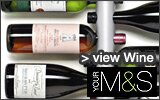A glimpse into the future: the social media shelf-talker
Posted on August 16th, 2010
Saved in Other sites of interest, Wine talk, Wine Writing
Tim Atkin, Master of Wine and UK Times wine writer had an interesting succinct piece on the role social media is playing in the wine world. He laments how slow those within the wine industry are slow to adapt to these new ways.
Wine is sold, described, criticised and presented is changing for ever. The surprising thing is that many of the people who work in and around wine haven’t noticed or are in denial about the power and scope of the revolution.
Then, looking towards the punter, Tim goes onto say,
“One of the most remarkable things about the internet, typified by Wikipedia but apparent everywhere, is that people are happy to share their opinions for nothing. Some of these opinions are worth more than others, but they are freely and often rapidly expressed. If you want feedback on a new wine, label, brand or concept, what better way to get it? Using new communications tools, punters readily exchange views, news and tasting tips on a worldwide scale.
Latent demand and harnessing the power of social media
On one side we’ve got what looks to be a pretty conservative industry, but on the other a very progressive, clear demand for engagement (not just the fermented grape juice). So, how can the former exploit this latent demand?
The shelf-talker of the future?
A “shelf-talker” is often a the tasting note and/or opinion given by an established wine writer in his publication which is then reprinted or re-purposed by the retailer.
Having seen just one aspect of what’s possible with adegga.com and their barcode-based dynamic wine labels, I took to glimpsing into the future of what the shelf talker could be, using the “wisdom of the crowd” and the power of reviews “from people like me”.
By aggregating reviews, there is an added veracity to the endorsement of the wine. Amazon is the poster child of the power of reviews, but what say you, could this work?


Nice one. We have critics quotations on our price signs, including one or two from a dodgy geezer called Lar, and a few have customer reviews from the website. Certainly something worth developing further.
Bang on Lar (and Tim).
Talked to Blake Creedon (Examiner) recently and he agrees – the way forward is social media.
The industry is waking up slowly to the growing influence of blogs and websites.
Wine lovers are just as likely to walk into a shop these days and say: ‘I read about this wine on a website’ as they are to utter: ‘I read about this wine on in the Bugle last week’.